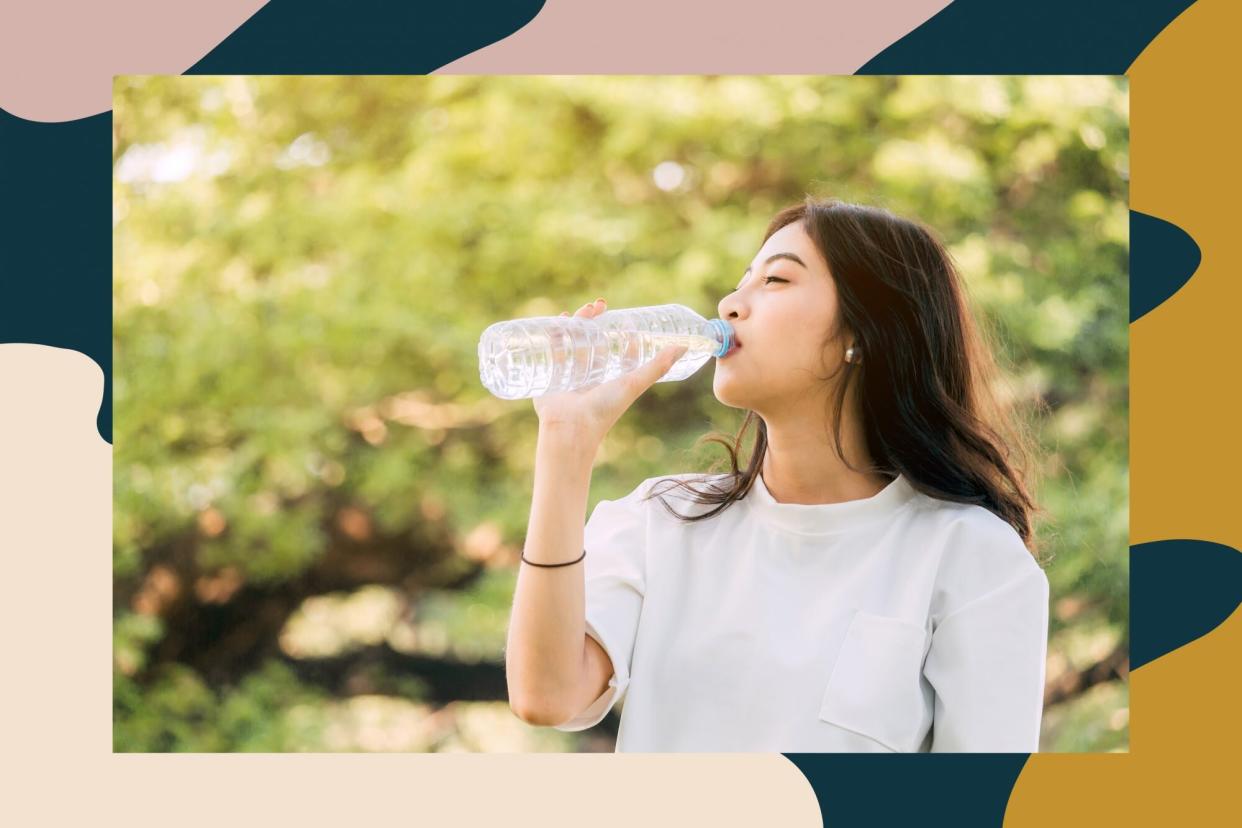Do Hydration Tablets Replace the Need for Drinking Water? A Nutritionist Explains

Getty Images
Keeping up with the surge of "cure-all" wellness fads is a job in and of itself. In our column Wellness Inspector, we do the work for you, closely examining these trends to see if they're worth your hard-earned pennies—or whether they're just hype.
It's no secret that hydration is essential. In elementary, middle, and high school, many of us were taught that drinking eight glasses of water (or 64 ounces) would do the trick. More recently, however, dietitians, general practitioners, and personal trainers have been touting that the magic number is half your body weight in ounces of water (meaning that if you weigh 150 pounds, you need to drink at least 75 ounces of water a day).
It's because of this that the gallon water trend—in which folks aim to consume a gallon of water a day—has been on the rise. It's also because of this that people are looking for new ways to get more water. As such, hydration tablets and powders—such as Nuun, Hydrant, and DripDrop—were born. But the question is: Do these products really work? And do they replace the need to drink as much water? We chatted with a dietitian and two brand representatives to find out.
What are hydration tablets?
Hydration tablets and powders are essentially the new and improved Gatorade or Powerade, in that they're chock-full of electrolytes.
"Electrolytes are minerals that aid in the balance of fluids in the body," explains N.Y.C.-based dietitian Dr. Jennifer Maeng of Chelsea Nutrition. "They have a significant role in maintaining blood pressure, muscle contraction, and pH levels, as well as maintaining overall body function."
Why are electrolytes important?
Remember: electrolytes help maintain fluid balance in the body. Whenever we exercise, sweat, or get sick (whether orally or out the other end), we lose electrolytes in the process, which effectively causes a dip in our hydration levels and can lead to dehydration. By replenishing these lost electrolytes, we can ward off the dizzying (and potentially dangerous) effects of dehydration.
We know what you're thinking: But why not drink Gatorade or Powerade? As much as we love these beverages, there's no denying that they're loaded with carbs and sugar. That's part of what makes hydration tablets and powders so unique. They offer all the electrolytes with a tiny fraction of the sugar and carbs—if any at all.
Do hydration tablets and powders work?
According to Maeng, yes. "Products like Nuun contain specific amounts of electrolytes (sodium, potassium, magnesium, calcium, and sodium bicarbonate) that help your body retain fluid and replenish the body to make up for significant electrolyte and water loss," she explains. "Essentially, the nutrients inside of products like Nuun help your body absorb the water better."
And that's all thanks to the electrolyte make-up. "Electrolytes are the key here; they help retain fluid, improve absorption, as well as provide a fluid and electrolytes balance inside of cells, helping promote normal and healthy body function," adds Vishal Patel, the director of product development at Nuun.
Wait, why does absorption matter?
You might think that simply drinking your 8 to 12 cups or half your body weight in ounces of water is enough to stay hydrated. However, when you rapidly drink water, it can sometimes pass quickly through your body, not getting absorbed throughout the process. That's where electrolytes help.
"Water alone hydrates you, but adding the right balance of electrolytes and a little sugar helps your body absorb water earlier in your digestive system, which hydrates you faster," explains John Sherwin, the co-founder of Hydrant.
hellogiggles Available at Amazon
hellogiggles Available at Amazon
hellogiggles Available at Amazon
Okay, so do you still need to drink as much water then?
If you're getting hydrated faster and sooner when using hydration tablets and powders, the question becomes is it really necessary to drink as much water? In short, yes.
Just because you drink two eight-ounce glasses of water with a tablet dissolved in each doesn't mean that those are somehow going to fully hydrate you to the effect that eight glasses would. Instead, hydration tablets and powders just help you get the most out of the water and watery foods you are consuming.
That said, hydration tablets and powders aren't for everyone. Like Gatorade and Powerade, these electrolyte-enhanced products are best for athletes and those overcoming illness, as both instances can lead to extreme electrolyte loss.
If neither of those scenarios pertains to you, Maeng says that you can get away without hopping on the hydration tablet/powder bandwagon.
"If exercising for only an hour or less, simply drinking water and having a well-balanced diet is sufficient to replenish the body," she explains, noting that dietary intake is enough to offset electrolytes lost during moderate exercise and activities. "However, if you are exercising for more than an hour and a half, especially in high temperatures (and on days an adequate meal may not be attainable), having an electrolyte drink is not a bad idea, as intense physical strain and high temperatures can result in significant electrolyte loss."
The Bottom Line:
Hydration tablets and powders taste good, they replenish electrolytes, and they typically contain less sugar and carbs than their pre-bottled counterparts. As convenient as they are for on-the-go athletes, folks with demanding physical jobs, or people who are overcoming a bug, they're by no means a substitute for drinking water and staying hydrated.
"Electrolytes do not replace the needs for fluid intake," Patel explains. "You should still drink what's recommended based on factors such as training, weight, etc., only adding electrolytes or products to a few glasses per day. Doing so will ensure you enhance and properly utilize the water you are consuming. Water is still 'king;' you just need a little help from electrolytes to ensure the water gets to where it needs to."

